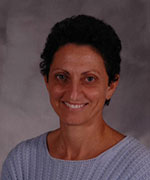As part of VA’s Diffusion of Excellence Initiative, the VHA Shark Tank Competition offers a unique opportunity to recognize employees’ commitment to caring for Veterans by cultivating innovation from within. The competition, inspired by the ABC television show, Shark Tank, identifies field-developed promising practices and facilitates the standardization of those practices across the VA healthcare system. Since the competition’s launch, Shark Tank has identified 36 practices that combined, have improved outcomes for more than 96,450 Veterans. For example, “The Preventing Veteran Suicide by Partnering with Faith-Based Organizations” practice has reached nearly 2,000 at-risk Veterans through faith-based partnerships established through the Program.
Submitted practices undergo evaluation by VHA subject matter experts. Applicants compete for the opportunity to be one of 20 finalists who pitch their practices at the virtual competition to medical center and network directors. During the virtual competition, the leadership team bids resources—such as money, staff, or time—to implement the practices they want in their facilities. VHA senior leaders then select approximately 10 finalists and 10 network directors as winners. The winning practices then move ahead with facilitated implementation at the directors’ facilities, with successful implementations being positioned for potential national rollout across the VA healthcare system.
Each competition requires that participants address a particular VA priority focus area. Submissions for this year’s competition, which kicked off in April, addressed the following priorities: Access; Care Coordination; Employee Engagement; Medical-Surgical Nursing; Provider Recruitment and Retention for Rural Facilities; Quality and Safety; Suicide Prevention; and Veteran Experience. Among the finalists announced on July 2 are four HSR&D investigators:

Susan N. Hastings, MD
Susan N. Hastings, MD, is Director of HSR&D’s Center for Health Services Research in Primary Care, in Durham, NC. She is the team leader for “Getting Hospitalized Veterans Back on Their Feet: The STRIDE Program,” which consists of a one-time gait and balance assessment conducted by a physical therapist, followed by daily supervised walks by a therapy or nursing assistant for the duration of the hospital stay. Program evaluation has demonstrated high satisfaction among Veteran participants and reduced need for post-acute institutional care. Outcome measures include reduced discharges to skilled nursing facilities, reduced length of hospital stay, and improved Veteran experience.

Judith Long, MD
Judith Long, MD, is Co-Director of HSR&D’s Center for Health Equity Research and Promotion in Philadelphia and Pittsburgh, PA. She is the team leader for “Better Health, Lower Cost: How IMPaCT Community Health Workers Can Support Veterans.” For Veterans struggling with real-life challenges such as hunger, housing insecurity, or trauma, community health workers (CHWs) are trusted laypeople who share a common background (i.e., race, income, Veteran status) with their patients. Therefore, CHWs are well-positioned to build trust with fellow Veterans and address unmet social needs. IMPaCT consists of a standardized, evidence-based program in which CHWs are hired and trained to join healthcare teams and provide social support to high-risk patients. IMPaCT has been tested in three randomized controlled trials, including a recent multi-center trial involving chronically ill Veterans. These trials demonstrate consistent improvements in chronic disease control, mental health, and quality of care, and reductions in hospitalizations by 65%. To date, IMPaCT has been delivered to nearly 7,000 patients in the Philadelphia region, including 270 Veterans at the Corporal Michael J. Crescenz VA Medical Center. The primary outcome is reducing total hospitalized days through facilitation of social supports and community reintegration.

Miriam Morey, PhD
Miriam Morey, PhD, is Associate Director of the Durham VA Health Care System Geriatrics Research Education and Clinical Center. She is team leader for “Gerofit,” an exercise and health promotion program that provides personally-tailored exercise programs for older Veterans. Gerofit supports facility-based programs, home-based counseling programs, and various modalities of hybrid outreach programs (e.g. Tele-Gerofit at CBOCs, Geriatric Walking Clinic, virtual-on- demand home exercise). Thus far, the Gerofit program has resulted in a 25%, 10-year reduced mortality rate and a reduced risk of institutionalization. Gerofit also has resulted in a significant reduction in Veterans’ cardio-metabolic risk profiles. In addition, GeroFit has reduced the numbers of prescribed medications following 12 months of exercise. For patients with PTSD, 86% of participants reported that participation in Gerofit improved their symptoms. The key outcome measures for the program include: reduced risk of institutionalization measured by improved physical function, reduced medication utilization; improved cardio-metabolic health, and improved mental health/well-being.

Matthew Crowley, MD
Matthew Crowley, MD, is a core investigator with HSR&D’s Center for Health Services Research in Primary Care in Durham, NC, and a VA HSR&D Career Development Program awardee. He also is team leader for the “Advanced Comprehensive Diabetes Care (ACDC)” program, a nurse-administered telemedicine intervention that augments standard home telehealth services with diabetes self-management support and clinician-guided medication management. In the initial randomized pilot at the Durham VA Medical Center, ACDC improved HbA1c by an average of 1% vs. usual care over a six-month period, and by nearly 2% among engaged Veterans. Diabetes self-care also improved significantly in the ACDC group. Although ACDC did not specifically address hypertension, blood pressure improved in the intervention group. ACDC was well-liked by Veterans and supported them in developing greater awareness of their blood sugars and positive self-management routines. ACDC’s efficacy has been supported by implementation work at two additional sites. Primary outcome measures include diabetes control, patient satisfaction, and implementation measures, including Veterans served, and staff perceptions.